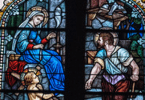
by David Gibson
Choosing the name of a new publication can be an agonizing process. This was true nearly 50 years ago for Origins, Catholic News Service’s documentary weekly. But to be clear, the name finally selected was in no way arbitrary.
As the publication of an internationally recognized Catholic news agency, Origins aimed to put current texts in the news at subscribers’ fingertips, texts that served as the origins of so many of the day’s central religious news stories. Origins would enable subscribers to see for themselves what texts behind the news said and how they said it.
It sounds strange to say that the rapid delivery of such texts to subscribers was a novel development then. Catholics were accustomed to long waits before seeing texts in English of major new documents such as a papal encyclical, for example.
Origins was a perfect fit for the news service, then named National Catholic News Service. We often said that the texts Origins published were a natural resource of the news service, a byproduct of its very work.
The mindset that Origins was an authentic news vehicle motivated its tiny staff to bring a sense of urgency to this work. The attitude was that news of the church in documentary form, in its “origins,” needed to be published accurately and quickly.
Origins began May 24, 1971, not quite six years after the December 1965 close of the Second Vatican Council. It was a time of intense interest among Catholics in the council’s accomplishments and how its 17 documents would be implemented around the world.
So the ecumenical movement fostering Christian unity, the collegiality of pope and bishops or the active involvement of lay people in the church’s life and work attracted unlimited attention. Catholics wanted to understand more of what the council’s liturgy constitution meant by insisting that no Catholic is just an observer of the liturgy, that all participate actively in sacramental celebrations.
In the era ahead, Catholics unrelentingly pursued understanding of the council’s affirmation that all in the church, not just some, are called to holiness. Roles for Catholics in the political order and every form of pastoral ministry would be examined tirelessly.
Origins began in this context. High levels of interest in conciliar issues surely accounted significantly for the surprising welcome Origins immediately received.
The challenges of that postconciliar time meant we literally had our work “cut out for us.”
Little things meant a lot in Origins’ history, like email. That taken-for-granted convenience of 21st-century life was nowhere in the picture when Origins started, nor was the internet’s amazing information-gathering capacity.
It is a wonder that Origins survived its initial production methods. Documents had to be typed from scratch, aided by part-time workers; we all pitched in. Errors were corrected the “old way.” A graphics technician pasted-in corrected words or phrases as we raced the best we could toward each weekly deadline.
But with email’s arrival, already-typed texts were delivered to us electronically. Gone were the days of waiting with bated breath for texts to arrive in the mail. Email played a big role in assuring Origin’s timeliness!
I mention this by way of highlighting Origins’ continued development over time. Origins always was a work in progress. Initial goals remained firm, yet the church’s dynamic life meant that news of the church continually changed. As new issues assumed importance, Origins also changed, grew.
The postconciliar era never closed. But it could not remain new forever.
The acute fascination with Christian ecumenism waned somewhat, but interest in interreligious dialogue involving Muslims, Buddhists or Hindus expanded.
Polarization sadly intensified in church and society, while globalizing forces highlighted the need for improved relationships among peoples and fostered new outlooks on the realities of migration. The church’s response to the sexual abuse crisis was to consume vast attention.
These and many other issues repeatedly challenged Origins to revisit its founding goals, while also coming to terms with what is required to serve as a Catholic news documentary in every new time period.
Then, in 2010, Origins entered an astonishing new era. Harnessing wonders of the digital age, it made every text it ever published accessible at the originsonline.com database. The entire database is easily searchable.
In my eyes, though I retired in 2007, this development meant that Origins was young again, fully ready to serve a changed audience.
First, over time, social communications experienced a transformation. Almost everyone now seems to have some access to the internet and its information riches. Nonetheless, the information explosion still can prove overwhelming.
Life and ministry in local Catholic churches also had experienced a transformation. Now laypeople, often volunteers, fulfill so many indispensable roles in parish life and committees! These people may not have time on their hands, but their information needs can be acute.
Is a specific text needed? Is background sought on any of thousands of faith-related topics? A simple search at originsonline.com reaps tremendous rewards. I use it all the time.
The database is a dream fulfilled. Origins always wanted subscribers to discover how its individual editions work together, combining over weeks, months and years into a resource useful in their endeavors.
That explains why Origins’ pages always included margin sections referring readers to past texts of current interest. It explains why the Origins staff once worked against all odds to prepare detailed quarterly author and subject indexes.
A note in Origins’ very first edition asked: “What must be done to help people get to the information they need when they need it? What tools need to be provided so that available information is more help than hassle?”
No one foresaw how those questions would be answered one day by originsonline.com, a reference system in itself.
In 1971, Origins was unique, rapidly delivering much-sought texts to subscribers. It still fulfills this invaluable role. But today, its database reaches beyond rapidity, instantly placing needed information into the hands of church leaders and groups of all kinds.






